Austin is not only one of the fastest growing cities in the United States in the past decade – and a booming tech hub with a gravitational pull that has started to rival Silicon Valley for tech talent and companies, giving it the nickname “Silicon Hill” – But in 2022 Austin is leading the nation in the deployment of Intelligent Infrastructure.
In fact, Austin is fast establishing itself as the blueprint for national deployment of intelligent infrastructure – expected to be the biggest single national deployment of infrastructure since Eisenhower’s Interstate Highway build out in the 1950’s. The City has already passed Resolutions of Support on smart city technologies, smart mobility, and charging networks, climate protection. And now, Mayor Steve Adler has thrown his support behind the Intelligent Infrastructure coalition growing in the region, commenting :

“It enables the city to move forward as one of the nation’s leading intelligent, equitable and livable cities. By working with our community stakeholders to adopt an intentional, unified, aesthetic digital infrastructure, the City of Austin will be a leader in providing equitable and robust digital community services….Importantly, these unified efforts to advance smart mobility, broadband for all, emergency services, public safety, environmental monitoring, national security and more, will also permit us to be intentional about creating and educating our workforce. A workforce that will design, build, maintain and build businesses on the infrastructure. Moreover, a integrated, intelligent infrastructure can and should target the digital divide within the Austin and surrounding regions with the distributed nature of its deployment.”
Register Now
FIRST PROJECTS INCLUDE:
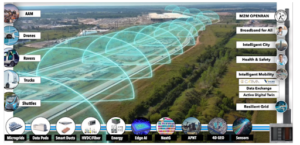
SH130 will be one of the first Intelligent, Autonomous, and Electrified Corridor in the Nation. The Autonomy Institute is collaborating with Texas cities and agencies on the 90-mile Texas SH130 corridor that will become the first in the nation. This intelligent corridor will support automated freight and delivery; intelligent and autonomous vehicles; and advanced services to communities along the corridor. Each Intelligent Corridor will activate PINN clusters to support edge computing, NextG, Broadband, and charging stations within regions that have been previously isolated or disconnected. We are seeing more technologies push for densified deployments down highways, within cities, and communities across the state.
Camp Mabry, a demonstration of resilient infrastructure for tactical deployments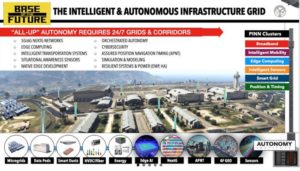
TMD Camp Mabry is supporting the first Intelligent Infrastructure Grid of PINNs. They will help advance the use of intelligent and autonomous systems for protecting our communities and providing resilience in Texas as well as the Nation.
Public-Private Partnerships will accelerate our national priorities and how Intelligent Infrastructure enables Resilient Cities & Bases. The Autonomy Institute will be providing the best intelligent and automated platforms to the brave men and women that protect our country.
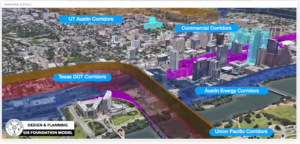
Austin Omniverse Project – Active Digital Twin
City digital twins can improve planning activities such as public engagement, scenario planning, and zoning and development.
The Digital Twin is the foundation for city planning, modeling of physical infrastructure, environmental indicators, resource consumption, zoning & regulation, transportation planning, and watershed management. The Digital Twin will require a data exchange with standardized data formats and that support cross-departmental experimentation.
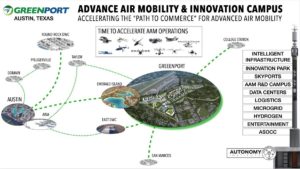
Greenport – Next Generation Aviation
The Autonomy Institute have partnered with a visionary developer building an airport from the ground up to support Advanced Air Mobility (AAM) and advancing Urban Air Mobility (UAM) throughout the Austin region, Texas and the nation. This includes a platform for as many of the aerospace developers working on developing, evolving and operating AAM and UAM aircraft. This platform includes the integrated parts of solutions required to advance intelligent and autonomous management, operations within cities, foundational infrastructures, equipment, manufacturing, all modes of transportation, defense, security and many other areas.
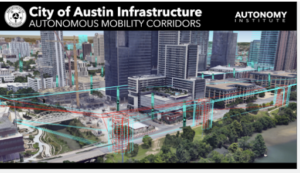 Autonomous Mobility Corridors and Autonomous City
Autonomous Mobility Corridors and Autonomous City
Supporting the deployment of autonomous systems within a city will require corridors of operations to be defined. These corridors will leverage easements within cities to support the Intelligent Infrastructure required by autonomous cars, trucks, shuttles, rovers, drones and other vehicles that can provide sustainable value to the city operations. In the initial phase the focus will be on ground based delivery solutions and small, under 10 lbs, drones that can provide valuable insights to both public and private industry. These small drones will also provide a tremendous amount of data to Universities and Federal testing centers to define the critical standards needed to support autonomy. In order to support the deployment of rovers and drones at scale, aviation easements will be defined. Avigation easement is an easement or right of overflight in the airspace above or in the vicinity of a particular property. It also includes the conditions on the impact traversing or overflight may have from the lawful operation.
Combine Business with Business
Companies with major recent expansions in Austin include Tesla, Google, Amazon, Space X, Apple, Facebook and Oracles, joining companies such as Dell Technologies, HP, Silicon Labs, arm, NXP, Freescale, IBM, Dropbox, Rackspace, Paypal, and many more who already have established bases in the area. In fact, data from the Austin Chamber of commerce show there are over 8300 tech companies based in the Austin Metro Area. Why not make the most of your visit by combining the conference with other business meetings.
And Business with Pleasure
And of course, Austin offers plenty of things to do !!… for suggestions, check out our visiting Austin page.
